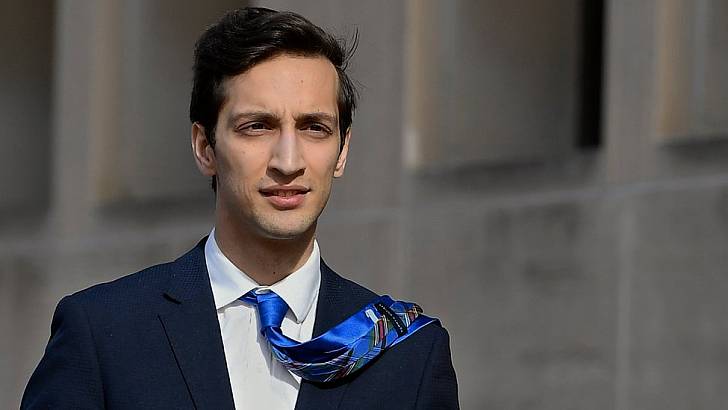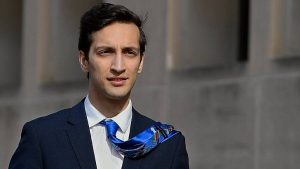
Last week, a New Haven jury acquitted Yale student Saifullah Khan of rape. Coverage of the case provided only the latest reminder of the one-sided, often effectively misleading manner in which the mainstream media covers the issue of campus sexual assault.
Because criminal charges were filed against Khan, he was entitled to constitutional protections (the right to representation from a lawyer who could fully participate in the process, the requirement that the state turn over all exculpatory evidence in its possession) that students accused through the campus Title IX process lack. An explosive filing from Khan’s lawyers on the eve of the trial suggested that the Yale Police Department withheld exculpatory information from the prosecutors; that investigators made improper comments about Khan’s ethnicity; and that Yale Title IX officials might have improperly disclosed FERPA-protected information about Khan. (The latter issue, ironically, also was raised in the Jack Montague case, which took place about the same time as the Khan allegations.)

This framework, however, appeared nowhere in coverage of the verdict, neither in the campus press nor in the mainstream media, which instead displayed a thinly-concealed bias that the jury got things wrong. The New York Times set the tone for coverage. The paper ran a long article on the case before the start of trial, framed under a thesis that the number of campus allegations reported to police was “vanishingly small.” Times reporter Veronica Wang wrote, “The Department of Justice estimates that between 4 percent and 20 percent of female college students who are raped report the attack to law enforcement.”
The 20 percent figure actually comes from a DOJ study, conducted by the Bureau of Justice Statistics. (It applies only to college students who say they’re raped, since, of course, non-reported allegations can’t be tested for accuracy.) But the “4 percent” study, though funded by the Justice Department, contains the following disclaimer: “Any opinions and conclusions expressed herein are those of the author(s) and do not necessarily represent the views of BJS and the U.S. Department of Justice.” It’s puzzling, therefore, that Wang would refer to the 4 percent figure as a DOJ “estimate[].”
Wang—now with a team of Times reporters—returned to New Haven for two long articles after the verdict. The first went through multiple edits, in a manner that seemed designed to conceal the reporters’ biases. The initial article, for instance, described an event that ended with a not-guilty verdict as one that featured a “victim” who had an experienced an “assault.” (After an outcry on Twitter, the Times added “alleged” to both descriptions, and changed another description of “victim” to “complainant.”) The initial article detailed the accuser’s “often tearful” testimony. (That description, too, got edited out.) The Times’ failure to acknowledge the stealth edits robs the reader of a chance to understand the context in which the article was written.
One odd factual assertion remained. “The state’s attorney’s office,” Wang and her colleagues wrote, “represented the complainant.” Does the New York Times really believe that the prosecutor represents the accuser, and not the people? Connecticut’s ethics guidelines, for instance, reveal the special obligations for prosecutors—obligations that wouldn’t apply if the prosecutor’s job was simply to “represent” the accuser.
The second post-verdict Times piece explored the differences between the definitions of consent in campus tribunals and in a court of law. (Wang did not mention that in a campus tribunal, Khan would have been denied the right to meaningful legal representation.) The Times quoted from a juror, Khan’s attorney—and multiple accusers’ rights advocates or sympathizers. Absent were the perspectives of FIRE, or FACE, or law professors who had expressed concern about due process.
This piece did quote from Vanessa Griogoriadis—author of a book hailing the guilt-presuming approach in current campus adjudication processes—who noted (seemingly approvingly) that campus tribunals, unlike courts, can return guilty findings for sexual behavior that’s “immoral but not criminal.” Meanwhile, the Yale Daily News paraphrased legal expert Katherine Baker: “Baker said the behavior Khan admitted to during the trial may not reflect the norms of respect and civility that most universities require of their students, even if his conduct was not criminal.”
Campus tribunals as morality police is the sort of thing that—as recently as a decade ago—would have been seen only on a small number of religious-right campuses. The idea that Yale is now little more than a left-wing version of BYU or Baylor is an unintentionally revealing commentary on the Puritanical strand behind the Title IX crusade.
Griogoriadis and Baker seemed like due process fanatics compared with Yale Daily News staff columnist Amelia Nierenberg who contended that despite the jury’s verdict, Khan was “not ‘not guilty.’” “Using legal standards of ‘not guilty,’” she fumed, “do not apply in a private community like Yale.” (Better to bow to the passions of the mob, it seems.) Her proposed standard: sex “outside the realm of appropriate” should equal expulsion. Nierenberg seemed particularly perturbed that the legal system, unlike Yale, doesn’t recognize the “affirmative consent” standard, which requires the accused student to prove that he obtained consent and thus shifts the burden of proof.
At least Nierenberg was writing an opinion column. How to explain a straight news Yale Daily News piece from Hailey Fuchs and two co-authors, which contained the following item: Yale student (and Khan rival in a Yale club) “Miller told the News she was concerned because she had heard in early 2014 — more than a year and a half before Khan was arrested on charges of sexual assault for the Halloween incident — that multiple female students had considered reporting Khan for sexual misconduct.”
Its very bad news for our current generation. hope we recover this situation soon.
Let us assume that Yale’s neo-puritans are critical of Mr. Khan for being non-monogamous. So were the accusers at Amherst and Mary Smith, the reluctant accuser at the recent Johnson & Wales case. Do they also think that women should be sanctioned for similar conduct?
4 percent and 20 percent of female college students who are raped report the attack to law enforcement, that very conscious for us. if we not control this situation its become big problem for your children and whole student as well.
Yet another episode of the long running saga, Pinch Sulzberger Builds a Latrine.
KC, just a note from a long-time admirer of your work. I first started reading you regarding the Duke farrago.
I can’t tell you how glad I am to see you continuing to bring sunshine into the dark corners of the kangaroo courts. I’ve added my poor contribution.
Your voice has been and continues to be crucially important. I’m quite certain that there are thousands like me silently reading your words and learning the truth.
Keep up the good work,
w.
NYT Reporters seem a little “modest” in their understanding of their own profession and how to “report” rather than “opine” these days. These examples are community weekly sort of errors and not what used to be expected at that level. Sad.
Bravo, Dr Johnson! … Just so I have this straight, “everyone” says Gods or Natural Law is bad including sexual restraint and Evolution is proven (what is your basis for morality again?). In this case, everyone is “doing it” with everyone, and on some colleges some of the girls are saying they didn’t consent
and we have a “rape crisis.” … Now, we need to have rules? Who is going to make those rules and on what basis?
In his article, Dr. Johnson writes:
“The idea that Yale is now little more than a left-wing version of BYU or Baylor is an unintentionally revealing commentary on the Puritanical strand behind the Title IX crusade.”
I believe it would be more accurate to describe the “unintentionally revealing commentary” as being totalitarian rather than “Puritanical,” an important distinction.
“But the ‘4 percent’ study, though funded by the Justice Department, contains the following disclaimer: ‘Any opinions and conclusions expressed herein are those of the author(s) and do not necessarily represent the views of BJS and the U.S. Department of Justice.’ It’s puzzling, therefore, that Wang would refer to the 4 percent figure as a DOJ ‘estimate[].'”
Are you kidding? No, it isn’t.